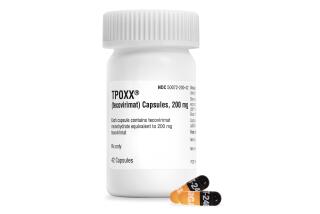FDA Expands Use of Drug in Treating AIDS Patients : Health: AZT now may be given to victims in the earlier stages of the deadly disease, resulting in better care, experts say.
WASHINGTON â The Food and Drug Administration on Friday expanded approved uses of the antiviral drug AZT to include AIDS patients in the early stages of the disease and individuals who are infected with the AIDS virus but have not developed overt symptoms.
Among the latter group, the FDA said, the drug should be administered only to patients whose T4 cell count has dropped below 500 cells per cubic millimeter of blood, an indication of immune system deterioration. The normal range for the critical immune system cells--the primary targets of the human immunodeficiency virus--is 800 to 1,200.
As a result of the FDA action, âbetter treatment can now be offered to thousands of people at earlier stages of infection with the AIDS virus before their health deteriorates critically,â Health and Human Services Secretary Louis W. Sullivan said in a statement.
AZT, also known as zidovudene, previously was approved only for use by patients with fully developed AIDS or advanced AIDS-related complex.
For patients who need the drug in the early stages of the disease, the FDA decision means that AZT therapy will be covered by insurance companies and other third-party payers. Insurers typically refuse to reimburse purchases of drugs prescribed for nonapproved uses.
In addition, many AIDS experts believe the action will result in an increased willingness to test other experimental drugs for use at an earlier stage of the disease, speeding up the timetable for making the medications available.
âWeâve been pushing for awhile to look at HIV disease as a continuous disease spectrum,â said Dr. Paul Volberding, an AIDS specialist at San Francisco General Hospital. âNow a drug has been shown to be effective at both ends of the spectrum of disease.â
Volberding was the lead researcher on a study that demonstrated the effectiveness of AZT on individuals who are infected with the AIDS virus but have not yet developed overt symptoms.
A panel of scientists convened by the National Institute of Allergy and Infectious Diseases is scheduled to meet in Washington today to draft a blueprint for physicians on how and when to prescribe AZT during early infection. The recommendations are to be released Monday.
The FDA action, which formally adopted recommendations made by the agencyâs antiviral drugs advisory committee in January, also is expected to encourage more individuals to take the AIDS antibody test to determine whether they are infected.
âIt is now time for people to find out,â Volberding said. âThe potential of benefits from this therapy are only effective at this stage if you know you are infected.â
The agencyâs action clearly was prompted by the results of studies of AZT use by AIDS patients in the early stages of the disease and those who are infected but asymptomatic.
The findings, announced last August, were so compelling that the studies were stopped for most of the participants so that those who had been taking a medically worthless placebo for comparison purposes could receive AZT instead.
The first study showed that AZT âsignificantlyâ slows the progression of disease in patients with early AIDS-related complex, a finding federal health officials estimated could benefit an estimated 95,000 to 200,000 people.
Two weeks later, the government said a second study had shown that AZT could delay the onset of AIDS in infected individuals with T4 cell counts of 500 or fewer per cubic millimeter of blood. The study also included infected individuals with T4 counts of more than 500, but the information was inconclusive. Research on that group is continuing.
The studies showed that AZT was better tolerated by patients who received it early. Many individuals with fully developed AIDS have experienced toxic side effects from AZT.
The FDAâs decision could affect about 600,000 of the estimated 1 million infected individuals in this country, federal health officials have said.
AZT, the only antiviral drug approved to treat AIDS, has been in widespread use since late 1986 and was formally approved in March, 1987. It has been shown to significantly prolong the lives of those with AIDS and AIDS-related complex and to reduce the frequency and severity of the infections that characterize the deadly disease.
More to Read
Sign up for Essential California
The most important California stories and recommendations in your inbox every morning.
You may occasionally receive promotional content from the Los Angeles Times.










